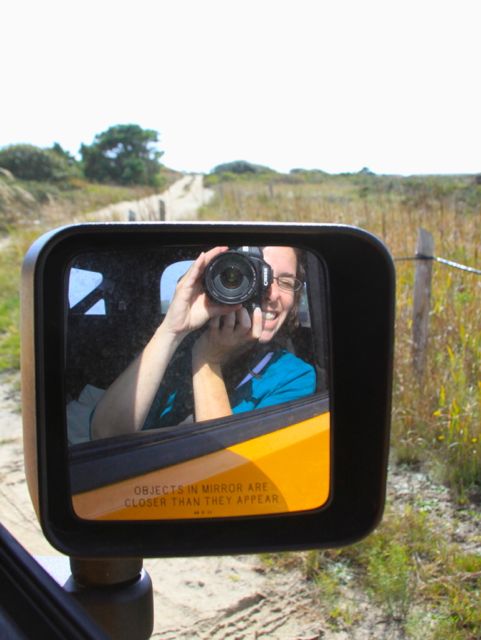
We were bombing along the twisty, narrow dirt paths that meander through the scrubby brush of Nantucket in our rented jeep. Vacation off-season. Fabulous. With the island practically devoid of fellow "tourons," we truly felt like castaways. OK, maybe we felt like castaways on the set of a Nicholas Sparks movie, but even so, the landscape coupled with the perfect stretch of warm, October days exceeded our expectations. I was in my shutterbug element. As we jounced and rolled through the bush in our faux safari atmosphere, I leaned out the window snapping anything that caught my attention, when something I glimpsed out of the corner of my eye startled me. It was a face: freckled skin, dopey smile, windswept hair, camera cocked and ready. It was me reflected in the jeep's side mirror. My first instinct was to lower my camera and continue scouting around for more appealing subjects. But then I thought "What the hell? Everyone should have at least one self-portrait, right?"
Had I not acted a little impulsively and also thought the shot was kind of interesting and fun composition-wise, I know I would not have taken the photograph. Like many women I know, turning the camera around on myself makes me squeamish. The litany of cringe-worthy self-criticism that runs Aaron Sorkin-like through my head is perhaps familiar to many: What's up with my lips? Why doesn't my hair look right? Thanks ruddy complexion! I thought that sweater made me look less frumpy!
When you're growing up, you're at the mercy of other people's clicks and captures. As an adult, the deliberate effort to shift focus back to yourself becomes weightier somehow, becomes a real act in the political sense and subsequently more difficult to enter into lightly for many of us.
The ubiquitous nature of photo-savvy smartphone capabilities have transformed the way an entire generation relates to and interacts with photographic texts (with outcomes decidedly mixed). Today's young women may be less self-conscious about self-imaging or, more likely, self-aware in the sense of understanding the power of the image and its many uses (for good and for ill). These young women, I believe, have a leg up on the rest of us shutter shy gals. They seem to harbor an instinctive drive to insert themselves into the frame in whatever capacity they wish -- a side view of nose, two giggling faces smooshed into the camera, a pair of Converse All-Stars poking out from under the frayed hem of denim -- amassing a vast library of self-images for little more than the sake of fun and whim. However, as I thought about my moment of photographic abandon and allowed myself to live with the squirmy feeling it gave me, I began to understand something important: By literally opting out of the photo, I know I'm opting out of the bigger picture. I know I am contributing to diminishing my own self-worth, to participating in airbrushing myself out of life.
Self-imaging has become an act of courage and empowerment for women as eloquently and poignantly explicated by writer/blogger Allison Tate in her wonderful Huffington Post essay, "The Mom Stays in the Picture." As a mother, Tate explains how easy it is to stay out of frame and instead put the lens on your child. "But we really need to make an effort to get in the picture," writes Tate. "Our sons need to see how young and beautiful and human their mamas were. Our daughters need to see us vulnerable and open and just being ourselves -- women, mamas, people living lives. Avoiding the camera because we don't like to see our own pictures? How can that be okay?"
It is never okay to authorize your own erasure. Tate's post is an urgent wake-up call for women of all kinds -- especially impactful for women who are also caregivers. Despite the integral nature of their daily responsibilities, caregivers often characterize what they do as simply "another part of being a mother" or wife, or sister, or family member. Already excised from their identities in a sense, women who are caregivers may feel even less inclined to make themselves present. They may prefer, instead, to continue embodying the misguided notion that "I don't matter. My child or husband or partner who needs assistance is the one who deserves the attention." But we know that this is a damaging and demeaning way to think and behave. Your presence should not come as a surprise; it should not take the form of a stranger peering back at you in the reflection of your car mirror. This willful estrangement not only lessens resilience and erodes self-worth, but it sends the wrong message to family and loved ones. After all, with so much of their lives framed by everything you do, doesn't it seem right for that frame to include you?

Photo by S. Moeschen
